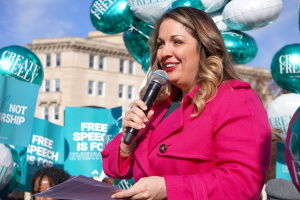High school backs down after opposing Christian language in student's graduation speech

A high school in Michigan has reversed course after initially telling a graduating senior that references to her Christian beliefs were "not appropriate" for her upcoming valedictory speech, her lawyers say.
After receiving a demand letter from the First Liberty Institute, officials at Hillsdale High School relented after pressuring student Elizabeth Turner to alter the valedictory speech for her June 6 graduation ceremony.
"I’m grateful I will be able to share my faith with my classmates, and I pray that God uses this situation to advance His kingdom," Turner said in a statement Thursday shared by First Liberty Institute, a legal nonprofit that defends First Amendment rights.
The religious liberty group sent the letter to Principal Amy Goldsmith on Wednesday, asking her to allow the valedictorian to talk about her faith as she had initially planned.
“Graduation is a time for celebration not censorship,” First Liberty Institute Counsel Keisha Russell said in a statement.
“Students retain their constitutional rights to freedom of expression from elementary school all the way through the graduation ceremony. All public schools should protect the private religious expression of their students."
Turner, who was chosen as one of the school's valedictorian speakers, had planned to tell the crowd that her "future hope is found in my relationship with Christ."
"By trusting him and choosing to live a life dedicated to bringing his kingdom glory, I can be confident that I am living a life filled with purpose and meaning," one section of the student's speech reads. "My identity is found by what God says and who I want to become is laid out in scripture.”
After reviewing a revised draft of Turner’s speech Monday, First Liberty reports that Goldsmith informed Turner that “we need to be mindful about the inclusion of religious aspects.”
According to the demand letter, Goldsmith told the student that "These are your strong beliefs, but they are not appropriate for a speech in a school public setting."
"I know this will frustrate you, but we have to be mindful of it," the principal was quoted as saying.
In the letter, Russell and First Liberty Counsel Mike Berry criticized Goldsmith’s assertion that Turner’s remarks about her religion were “not appropriate for a speech in a public school setting,” citing guidance from the U.S. Department of Education.
The guidance, issued Jan. 16, 2020, states that when students or other private graduation speakers are "selected on the basis of genuinely content-neutral, evenhanded criteria" and "maintain primary control over the content of their expression," that "expression is not attributable to the school and therefore may not be restricted because of its religious (or anti-religious) content.”
The guidance acknowledged that in cases “where school officials determine or substantially control the content of what is expressed, such speech is attributable to the school and may not include prayer or other specifically religious (or anti-religious) content.”
However, the guidance encouraged schools “to avoid any mistaken perception that a school endorses student speech that is not in fact attributable to the school” by making “appropriate, neutral disclaimers to clarify that such speech (whether religious or nonreligious) is the speaker’s and not the school’s speech.”
While Goldsmith never mentioned the First Amendment or the Establishment Clause of the U.S. Constitution, Turner’s attorneys explained to her that “student graduation speeches constitute private speech, not government speech, and private speech is not subject to the Establishment Clause.”
Citing the Supreme Court’s decision in Westside Community Board of Education v. Mergens, the attorneys maintained that “Ms. Turner’s statements do not transform into government speech simply because they are delivered in a public setting or to a public audience.”
“Hillsdale High School must comply with the law by allowing private student religious expression during graduation,” the attorneys concluded. “By doing so, it will teach students that the government should treat religion neutrally.”
Citing the Supreme Court’s decision in Good News Club v. Milford Central School, Berry and Russell told Goldsmith that “any perceived danger in students seeing their classmates engaging in religious expression, including prayer, is no greater than the danger in students seeing religion banned from public view.”
They warned her that “you are violating federal law which permits private religious speech at school events” and requested that she allow Turner to “express her private religious beliefs at the graduation ceremony.”
The attorneys also included screenshots of emails between Turner and Goldsmith indicating that the principal had already asked the valedictorian to make changes to her speech before she asked her to scrub its “religious aspects.” Turner expressed concern that she would not “be able to deliver a genuine speech” based on the stipulations laid out.
“I don’t agree that we should avoid the topic of tragedy and death because that is a part of everyone’s future,” Turner wrote. “I understand what you are saying but for me, this is a time for my peers and I to evaluate our lives and to choose how we want to live since we’re not promised tomorrow and I don’t want to write a speech that won’t be meaningful just to check off the box. I believe it is celebratory to call people to a life of purpose and meaning and a call to action to live a life as well.”
Turner stressed that "my personal future relies on my faith and I also want the freedom to be able to address that in my speech if the opportunity arises.” Goldsmith reportedly responded in a follow-up email, arguing that “I think one can call for a life of purpose without using the words death and tragedy.”
“While there is a degree of freedom to the content of your speech, there are also considerations of what the content and message should be at a commencement celebration and it’s appropriateness for the audience,” she continued. “When crafting a speech it is important to consider purpose and audience. Your speech has a good thesis, it’s the connotations of the word that you can avoid.”
Turner forwarded that email chain to her pastor, who then sent it to Russell. The demand letter was filed two days later.
In a subsequent chat, also attached to First Liberty’s demand letter, Goldsmith asked Turner, “what did you decide about presenting the speech?” Turner informed Goldsmith that she was planning on giving it, to which the principal replied, “You have added more content of a religious and focus on death nature so this was not clear to me.”
On Thursday, Russell praised the school's decision to "ensure that religious students can freely exercise their right to express their faith in a graduation speech."
“Elizabeth is thrilled that she’ll be able to celebrate her graduation without being censored," Russell said. "We hope that future graduates will be free from religious censorship.”
Ryan Foley is a reporter for The Christian Post. He can be reached at: ryan.foley@christianpost.com




























